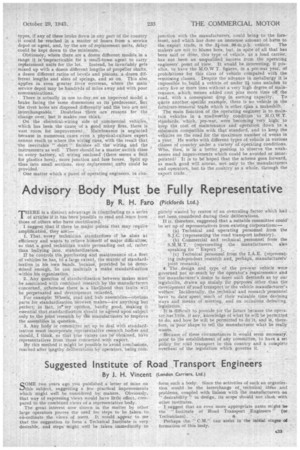Advisory Body Must be Fully Representative
Page 35

If you've noticed an error in this article please click here to report it so we can fix it.
By R. H. Faro (Pickforcis Ltd.) THERE is a distinct advantage in contributing to a series 1 of articles if it has been possible to read and learn from those of others who have cOntributed.'
' I suggest that if there be major -points that may require amplification, they are:- 1. That..-eves-y technician standardizes if he aims efficiency and wants to relieve himself of major difficulties; so that a good techniCian wants persuading out of, rather than bullying into, standardization. n he controls Purchashig and maintenance of.a fleet of vehicles he has, tr.1, a large extent, the matter of standardization in his own hands, because, provided he be deterMined enough, he can Maintain a make standardization within his organization.
2. Any question of standardization between makes must be associated With combined research by the manufacturers concerned, otherwise there is a likelihood that faults Will be perpetuated and deVelOpment retarded.
For example: Wheels, stud and hub assemblies—obvious parts for standardization between makes—are anything but perfect; in fact, in" my opiiiion, hardly.. good, -making it essential that standardization should be agreed upon subject only to the joint research by the inanufatturers to improve the assemblies in question, 3. Any body' or committee set up to deal with standardization must incorporate rep esentative research bodies and should, I think, so that true values can he obtained, hate . iepresentatives from -those ,Concerned with export.'
By this method it might be possible to avoid conclusions, reached after lengthy deliberaticins bV operators, being corn
pletcly wasted by reason of an overruling factor which had s not been considered during their deliberations. It is, therefore, suggested that a suitable committee could' be set up of representatives from existing corporations:— (a) Technical and operating personnel from the S.J.C. (representing the road transport industry). (b) Commercial and technical personnel from the S.M.M.T. (representing the manufacturers, also speaking for "Export "). _ • (c) Technical personnel from the I.A.E. (representing independent research and, perhaps, manufacturers' • joint research). _
4. The design and type of the pre-war vehicle -weie governed pot so, much by the operator's requirements and the manufacturer's desire to ineet such demands as by our legislatitin, drawn up mainly for purposes other than the development of road transport or the vehicle manufacturer's welfare. Incidentally, the technical and research personnel have to date spent much of their valuable time devising ways and means of meeting, and on occasions defeating, legsshtion
_ It is difficult to provide for the future because the opera
tor' has little, if any knowledge of what he will be permitted to do, and how he will be permitted to do it, and is, therefore, in poor shape to tell the manufacturer what he really wants.
Because of these circumstances it would seem necessary, prior to the establishment of any committee, to have a set policy for road transport in this country and a complete overhaul of -the legislation which governs it.




















































